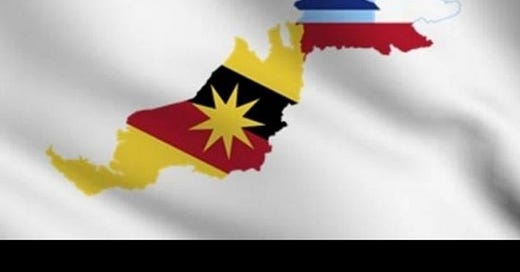14th December 2024
Borneo Human Rights Activists Call for Self-Determinations Amid Rising Malay Supremacy".....
The claim by the former prime minister Tun Dr Mahathir Mohamad and several Perikatan National leaders that have banded together to oppose a “common enemy” of the Malay refers.
As Borneo human rights activists that advocates for equality, we are deeply troubled by Malaysia’s alarming drift toward Malay supremacy and extreme racial policies. These ideologies not only contradict the Federal Constitution but also betray the original spirit of unity and mutual respect that led to the formation of Malaysia in 1963.
Not long ago, Sultan Nazrin Shah of Perak issued a statement in principle that "political exploitation of race and religion threatens national unity and must be swiftly contained".
But the recent escalation of racial and religious extremism, coupled with blatant disregard for the rights and aspirations of Sabah and Sarawak, forces us to confront an uncomfortable question: Does it still benefit Sabah and Sarawak to remain part of Malaysia?
1. Betrayal of the Malaysia Agreement 1963 (MA63)
When Sabah and Sarawak agreed to form Malaysia alongside Malaya and Singapore in 1963, it was under a promise of equality and mutual respect. The Malaysia Agreement 1963 (MA63) guaranteed autonomy for Sabah and Sarawak, including control over our resources, religion, and education. However, over the decades, these promises have been systematically eroded.
Instead of fulfilling the commitments of MA63, the federal government has prioritized Malay supremacy and policies that marginalize the ethnic Bornean tribes and Chinese communities who form the majority in East Malaysia. This is a betrayal of the founding principles upon which Malaysia was built.
2. The Reality of Malay Supremacy
Malay supremacy has become the dominant ideology in Peninsular Malaysia, dictating policies and governance. This ideology excludes not only non-Malays but also the native tribes of Sabah and Sarawak. Our people face systemic neglect, underdevelopment, and lack of representation, despite contributing significantly to the nation’s wealth through oil, gas, and other natural resources.
The extreme racial and religious policies being pursued in Peninsular Malaysia are in direct conflict with the multicultural and inclusive ethos of Sabah and Sarawak. These policies not only alienate us but also threaten the unity and diversity that Malaysia was meant to represent.
3. Pulling Out as a Viable Option
Given this reality, the best decision for Sabah and Sarawak may be to reassess our position within Malaysia. The ongoing marginalization of our people and the federal government’s refusal to honor MA63 make it clear that East Malaysia’s future may be better served outside the federation.
An independent Sabah and Sarawak could focus on uplifting the ethnic Bornean tribes and Chinese communities who have long been sidelined. We could build a nation based on fairness, inclusivity, and mutual respect—values that have been steadily eroded within Malaysia.
4. East Malaysia’s Diversity as a Strength
Sabah and Sarawak are home to a rich diversity of ethnic groups of Orang Asal and Chinese. Unlike Peninsular Malaysia, where racial and religious divisions dominate, East Malaysia has a history of coexistence and harmony among its communities.
Our strength lies in this diversity, and we must protect it from the toxic ideologies of Malay supremacy and extremism. Pulling out from Malaysia would allow us to preserve our unique identity and chart a future that prioritizes equality, development, and justice for all.
5. A Call for Self-Determination
The time has come for Sabah and Sarawak to seriously consider their options. Remaining part of Malaysia under the current trajectory of Malay supremacy and racial extremism is no longer viable. Our people deserve better than being treated as second-class citizens in a federation that was meant to be a partnership of equals.
We must explore the possibility of self-determination and independence, ensuring that the voices and aspirations of the ethnic Bornean tribes and Chinese communities are heard and respected.
6. Protecting the Spirit of Unity and Justice
Malaysia’s move toward Malay supremacy is a direct threat to the harmony and justice envisioned in MA63. If the federal government continues to ignore the legitimate concerns of Sabah and Sarawak, the only logical path forward is to withdraw from Malaysia and reclaim our autonomy.
Conclusion
As human rights activist, we firmly believe that Sabah and Sarawak have the right to decide their own future. The growing extremism and racism in Malaysia leave us with little choice but to consider independence. Let us work together to build a future where all communities — Bornean tribes, Chinese, and others — can thrive in equality and harmony, free from the toxic ideologies that plague Peninsular Malaysia.



